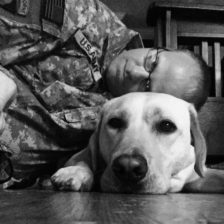June is sometimes recognized as PTSD Awareness Month. How aware are we of that, actually? Do you know the signs and symptoms? Can you spot someone in a coffee shop and think, “yup, bet they have PTSD?”
It is not always easy. It is not easy to admit, deal with, and live with every single day.
What does “I’m fine.” mean to you?
I saw an image (thank you, Wounded Warrior Project), and it really struck me that the words used under the phrase “I’m fine” might really be what someone is saying/wanting to say when asked that very question.
I know that when I’ve been asked, “how are you?” I often reply with “fine” or “good” and I also know at times I am far from those words.
PTSD is a mental health condition, but that does not mean every single veteran has PTSD. It affects mood and physical behavior. It knows no boundaries with gender, age, race, or occupation. People who have PTSD sometimes have trouble coping with and recovering from traumatic events.
So, how do you know or recognize the symptoms?
Some symptoms include the following:
- Acting angry or violent
- Feeling anxious or edgy
- Having flashbacks, nightmares, bad memories, or hallucinations
- Being uninterested in daily life
- Feeling afraid or helpless
- Feeling numb or detached from others
- Trouble sleeping
- Not being able to recall parts of the traumatic event
- Avoiding people or things that remind you of the event.
You may not recognize or know what these symptoms/feelings mean. People who have PTSD are sometimes also depressed. Causes of PTSD can range from being in a war time situation, or a victim of war (again, not all veterans have PTSD, please do not assume that to be the case), survivor of domestic abuse or rape, survivor of sexual assault, verbal abuse, an unexpected event like a terrorist attack or car wreck, surviving a natural disaster, or being a person who responds to traumatic events (firefighters, police officers, rescue workers)…it is not just a war time thing or a condition for veterans.
How can you help? What can you do?
- Talk to someone or seek support after the event. This is hard, especially for some of our military members.
- Seek treatment or try to manage previous health conditions that could be related to PTSD. This could range from anxiety to depression.
- Learning how to cope with the trauma. Going to therapy is a big step, and one that can be hard for some to take, but talking to someone (a medical professional) can help.
- Art or writing therapy–sometimes getting those feelings and memories out in a “different” or “unconventional” way is helpful, and some people prefer this to medication.
PTSD can be managed. There is no cure, but some of the symptoms can go away and can be worked through. Learning more about PTSD can help, and learning how to express feelings, especially when a response of “I’m fine” comes out can help too.

